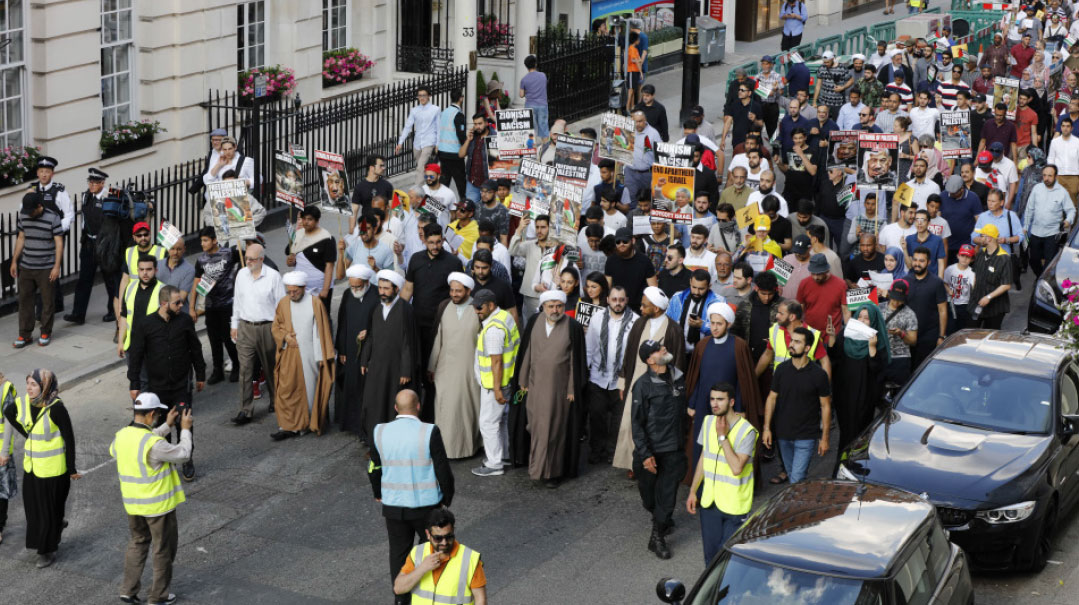Muslim Anti-Semitism: Four Takeaways

The significantly higher anti-Semitism found among British Muslims is expressed across the political spectrum — from liberals to conservatives

Britain’s lockdown was longer than most due to the country’s eye-watering death toll, but there was one silver lining: For the first time since it was started by Iran’s Ayatollah Khomeini in 1979, there was no Al-Quds Day rally in London. Instead, the misnamed “Islamic Human Rights Commission” had to move the May 22nd event online for the masses to fulminate against the Zionist entity.
The annual march, which regularly features anti-Semitic placards, is the most visible sign of the anti-Semitism disguised as opposition to Israel that is rampant across Britain’s left and Muslim community.
That animus has long been a depressing fact of modern British life. But a new report by the Henry Jackson Society’s Dr. Rakib Ehsan sheds light on the negative role of universities as well as the positive effects of greater social integration in dealing with the problem.
Here are four takeaways:
Anti-Semitism significantly higher in the Muslim community
“A December 2019 ICM Unlimited poll found that 18% of the general population felt Jews have disproportionate influence over business and finance,” writes Dr Ehsan. But “in this survey of British Muslims, 34% were of the view that Jews have too much control over the global banking system. And whereas 24% of the general population believed British Jews were more loyal to Israel than to the UK. The corresponding figure for British Muslims, in this survey, is 44%.”
At almost 20%, anti-Semitic stereotyping in the general population is high, but perhaps not shocking, given the widespread support enjoyed by Jeremy Corbyn’s Labour Party despite its anti-Semitism scandals.
However, the significantly higher anti-Semitism found among British Muslims is expressed across the political spectrum — from liberals to conservatives. That became obvious during the 2019 election, when all the major political parties were forced to suspend Muslim-background candidates accused of making anti-Semitic comments during the campaign.
Left wing universities
Although higher education is often seen as a marker of cultural openness, the survey found that British Muslims with a tertiary education were more likely, at 47%, to say that British Jews had greater loyalty to Israel than the UK, than those without tertiary education, at 40%.
But in light of the strongly left-wing atmosphere on British university campuses (highlighted by a recent Policy Exchange report that only 54% of academics would feel comfortable sitting next to a Brexit Leave supporter) and the left’s obsession with Israel, that should come as no surprise.
Social integration helps
“British Muslims who are part of relatively Muslim-dominant friendship networks are more likely to be of the view that Jewish people have too much global control,” says the report.
The solution — more integration — has been an unofficial watchword ever since former prime minister David Cameron said in a watershed 2011 speech that “under the doctrine of state multiculturalism, we have failed to provide a vision of society to which (minorities) feel they want to belong ... All this leaves some young Muslims feeling rootless.”
Caught in the dragnet
But the sharp end of the push to compel greater integration among religious minorities has been felt by Britain’s chareidi community in recent years. The excesses of Ofsted, the official schools inspectorate, which has targeted Jewish schools for failing to teach the mandatory tolerance curriculum (including exposure to alternative lifestyles), stem from an avowed policy of “muscular liberalism.” The country’s growing religious Jewish community faces ongoing friction where integration is the watchword.
(Originally featured in Mishpacha, Issue 823)
Oops! We could not locate your form.













